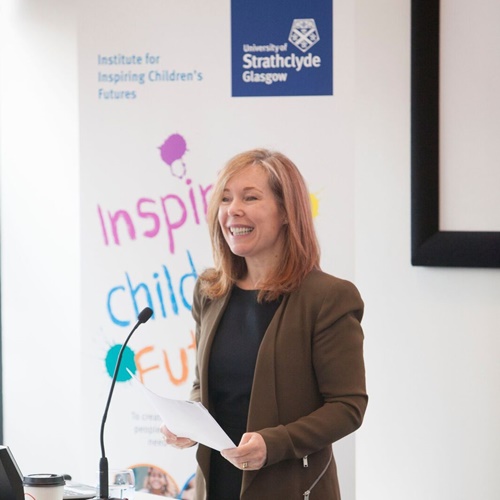Strathclyde People 2018
In 1994, a team of less than 10 people began working towards positive change for children in the care system in Scotland. Building on its success, its focus widened and that group became CELCIS (the Centre for Excellence for Looked After Children in Scotland) in 2012.
Part of the University of Strathclyde, and funded by the Scottish Government, CELCIS now has over 70 staff members and continues to make positive change to children with care experience and their families – not just in Scotland, but globally.
What is CELCIS?
For the last six years, CELCIS has been working to improve the life chances of vulnerable children and to prevent the need for care where possible. That’s done through supporting public services that help children and young people to achieve their full potential.
The team contains a range of expertise, such as law, social work, health, education, research, policy, and communications. They work on influencing all tiers of the care system: practice (practitioners working within care), systems (leaders on a local level), and policymakers (government). It’s their relationship with all local areas in Scotland that leads to effective policies being written by the Scottish Government – all based on the informed and valued perspective that CELCIS has.
The Strathclyde relationship
At the University of Strathclyde, we’ve got a long-standing record of conducting research on the education and wellbeing of children with care experience.
Bringing together the collective expertise of academic partners, CELCIS has been able to establish a range of activities and resources aimed at supporting professionals, including evidence-based consultancy, training and information. CELCIS works with local authorities and health boards to innovate and change practices, systems and processes in ways to deliver improvements for children and their families.
Local systems change
To minimise delay and disruption to children’s lives, the Scottish Government commissioned the PACE (Permanence and Care Excellence) programme within CELCIS. Now in its fifth year, the programme supports local areas to ensure all children have a permanent home without unnecessary delay. Last year alone, the permanence decision process was reduced by 25 weeks in one local area.
The award-winning improvement programme continues to achieve significant permanence progression by working locally with all agencies involved in the process, extending throughout Scotland.
Global impact
Caring for children is a global issue. The international work of CELCIS involves both Scotland learning from the rest of the world – in terms of what works well for caring for vulnerable children – and how the world can learn from what we do here in Scotland.
In 2015, the UN set the Sustainable Development Goals – featuring goals specifically based on children for the first time ever. As well as the goal to end violence against children, the first goal on the main list of 17 is to end poverty – both these issues are deeply relevant to every country’s most vulnerable children.
CELCIS is working with the European Commission and the UN to realise these goals and has produced a handbook on the subject matter, translated into eight different languages.
Alongside international partners, CELCIS has developed a free Massive Online Open Course (MOOC) looking at the UN Guidelines for the Alternative Care of Children. In collaboration with Harvard University and sponsored by a taskforce of international humanitarian agencies, a new MOOC is in progress to support those working with unaccompanied and separated children on the move.
Making a difference
Professor Jennifer Davidson joined the University of Strathclyde in 2003 to direct the predecessor organisation, and is the Executive Director of CELCIS. She’s also Executive Director of an emerging cross-University initiative – the Institute for Inspiring Children’s Futures. This initiative aims to meaningfully strengthen the links between research on the core determinants of children’s outcomes. This year, it’ll focus on the impact of poverty on children’s adversity.
Professor Davidson says:
At CELCIS, we have the clear sense of making a difference for children and their families – translating between what is real on the ground, and the changes in practices, systems and policies that can have the biggest impact, both in Scotland and around the world.
CELCIS is a fantastic team of highly skilled and deeply committed staff who are driven to see real life improvements for children and young people. Our passion means we are always learning, changing and innovating alongside our many partners, to support the best possible outcomes for children and their families.
Keen to support the difference Strathclyde makes around the world?
CELCIS is one of many initiatives the University is developing to help address the global challenges of the 2030 Sustainable Development Goals.
To find out more and to get involved, simply email alumni@strath.ac.uk


